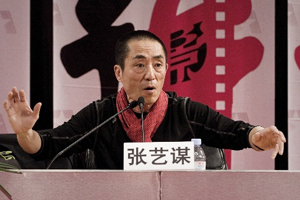Architect of Beijing’s Olympic Ceremonies to Receive Honorary Degree
Filmmaker Zhang Yimou will attend 2009 Commencement

Chinese filmmaker Zhang Yimou, who directed the opening and closing ceremonies at the 2008 Olympic Games in Beijing, will receive an honorary Doctor of Humane Letters at Boston University’s 136th Commencement ceremony next May.
The honor was announced this month at the annual conference of the International Association of Film and Television Schools (CILECT), which was held in Beijing and drew participants from around the world, including Tom Fiedler (COM’71), dean of the College of Communication. Fiedler presented the formal invitation to Zhang at an event organized by BU Trustee Hugo Shong (COM’87, GRS’92), president of the Boston University Alumni Association of China. While BU’s honorary degree recipients typically are not revealed until the annual Senior Breakfast in May, President Robert A. Brown says that the University’s active Chinese alumni base, as well as Fiedler’s involvement in the CILECT conference, made the timing right for the announcement.
 “Your accomplishment in leading the production of the opening and closing ceremonies of the Beijing Olympics in August left the world in awe with their unparalleled beauty and magnificence,” Brown wrote in his invitation to Zhang. “Your successful pursuit of artistic excellence has enriched audiences around the world, and your efforts to pursue a career as a director and artistic leader is itself an inspiring story.”
“Your accomplishment in leading the production of the opening and closing ceremonies of the Beijing Olympics in August left the world in awe with their unparalleled beauty and magnificence,” Brown wrote in his invitation to Zhang. “Your successful pursuit of artistic excellence has enriched audiences around the world, and your efforts to pursue a career as a director and artistic leader is itself an inspiring story.”
Zhang, whose works include Red Sorghum, Raise the Red Lantern, and The House of Flying Daggers, has earned two Academy Award nominations and a litany of prominent international film festival honors. Known for his visually striking cinematography and epic portrayals of historic and modern-day China, Zhang garnered international acclaim for his early films everywhere but in China, where they were initially banned by government censors. Yet this past August, decades after he began his career, he was chosen to direct 15,000 actors, musicians, and acrobats in the opening and closing ceremonies of the Olympic Games before a stadium crowd of 91,000 and television viewers numbering about a billion. It was a high honor from a country that for years had censored his work.
Born in 1951 in northern Shaanxi Province, Zhang came of age during Mao’s Cultural Revolution. He was the son of an officer in the Nationalist Kuomintang forces, which had fought and lost to Mao’s Red Army in a protracted civil war. The family was ostracized and harassed, and Zhang was forced to leave high school and work as a farmhand and a mill worker.
His film career nearly didn’t happen. The Beijing Film Academy, China’s only film school, had closed its doors during the Revolution, and when it finally reopened in 1978, Zhang, at 27, was too old to be accepted into the program. Initially rejected because of his age, he successfully petitioned the Ministry of Culture for admission. In 1982, he graduated as a member of China’s Fifth Generation, the first cohort of Chinese directors to study Western film forms and move away from the accepted genre of communist propaganda.
Although rarely overtly political, Zhang’s early work was deeply influenced by his experiences in Mao’s China. Despite wide international acclaim, several of his first films, including Raise the Red Lantern (1992), which portrayed the harsh domestic realities of women in 1920s China, and To Live (1994), which traced one family’s tragic journey over the four decades preceding the Cultural Revolution, were considered thinly veiled political allegories and ultimately earned Zhang a five-year ban from making films in China with foreign funds.
Continuing to make films, Zhang eventually regained the favor of the Chinese government. He turned to less politically charged big-budget martial arts genres that brought both critical and box office success. He also began directing stage productions. In 1998, the Chinese government permitted him to stage Giacomo Puccini’s opera Turandot (which is set in Beijing) in the 500-year-old courtyard of the Forbidden City — a request never before granted.
Zhang is now considered one of China’s greatest living treasures, and his films “have offered worldwide audiences both a perspective on the people and culture of China,” Brown says, “and a window into universal aspects of human nature and yearning.”
Comments & Discussion
Boston University moderates comments to facilitate an informed, substantive, civil conversation. Abusive, profane, self-promotional, misleading, incoherent or off-topic comments will be rejected. Moderators are staffed during regular business hours (EST) and can only accept comments written in English. Statistics or facts must include a citation or a link to the citation.